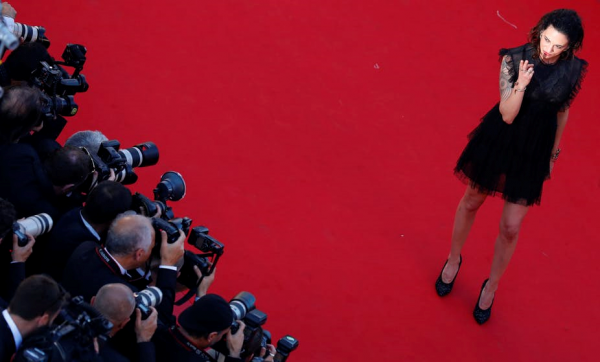
Actor Asia Argento arrives at the 2017 Cannes film festival. EPA/Ian Langsdon
O’Rawe Catherine, University of Bristol and Danielle Hipkins, University of Exeter
Italy has long been regarded as being backwards when it comes to gender rights and sexual harassment. So in many ways, its reaction to the recent wave of revelations about sexual harassment by men in positions of power all over the world was depressingly familiar. But, at the same time, it also revealed the strength and diversity of grassroots feminism there, despite the odds.
Simona Siri, a US-based Italian journalist, pronounced recently in The Washington Post that “the already present and strong sexist Italian culture now seems almost impossible to reverse”. This came following the startling backlash against Italian actor Asia Argento after she gave an an interview to Ronan Farrow for The New Yorker in which she accused Harvey Weinstein of a horrific sexual assault. Siri argued that Italy’s entrenched misogyny, embodied by the figure of Italy’s former prime minister Silvio Berlusconi, made fighting back futile for Italian women.
Argento’s story was one of the accounts that ignited the #metoo movement internationally. But in Italy, she was attacked, and left Italy, troubled by persistent social media victim-blaming.
Many asked why she had continued to have a relationship with the producer after the alleged assaults. One particularly harsh headline in the right-wing paper Libero read “Prima la danno poi frignano e fingono di pentirsi” – “first they put out, then they whine and pretend to regret it”. The article featured a particularly provocative photo of Argento and questioned why she hadn’t asked her powerful father, acclaimed horror director Dario Argento, to help her expose Weinstein.
The bunga bunga legacy
Italy’s image as lacking in feminist culture is in no small part due to Silvio Berlusconi’s tenure as prime minister – a period marked by multiple sex scandals. But this also unleashed a successful, popular social movement called “Se Non Ora Quando” (If Not Now, When?) in 2011. Nearly a million Italians took to the streets to protest against the objectification of women and the so-called bunga bunga culture propagated by those in power.
Alongside the street movement came social media activism. In one project, Italian women shared 142 videos under the heading “A Country for Women: Words to Say It”. Each reflected on their lives in Italy and their own experiences of sexism, such as the woman who talks about losing her job due to pregnancy, or the woman who, trafficked to Italy, works to help other vulnerable immmigrant women.
Now, many established Italian second-wave feminists are speaking out strongly in support of Argento. Ida Dominijanni, left-wing journalist and feminist philosopher, and prominent academic author Michela Marzano are among them.
The group “Non Una di Meno” (Not One Woman Less), which campaigns against violence against women, organised a huge protest in November that brought tens of thousands of people to Rome. They also wrote an open letter in support of Argento. Intersectional feminist blogger Abbatto i muri (I Break Down Walls) also spoke out in support.
Meanwhile, radical collectives from all over Italy such as the Cagne sciolte (Wild Bitches), which fights for LGBTQ and migrant rights, often in an uneasy relationship with their more bourgeois sisters, added their voices too. Cagne sciolte tweeted out in support of Argento: “Here how we’ll explain it. NO MEANS NO. IF YOU TOUCH ONE, YOU TOUCH ALL OF US.”
A breakthrough
It is important to pay attention to these voices. They are too often neglected in the rush to paint Italy as hopelessly behind the times on gender politics. And while it may feel like change is impossible in a country where 69% of female university students report having suffered sexual harassment, incremental improvements are happening.
The international context of #metoo provided impetus for the Italian hashtag #quellavoltache to take off. This gave Italian women the opportunity to recount their own experiences. Now, ten women have accused successful director Fausto Brizzi of harassment. It may not seem like much, but it does represent progress within a sexist film industry that the allegations were immediately perceived to be damaging to Brizzi.
It is clear that Italian women still have a long way to go in the struggle against sexual violence, harassment, and gender inequality at an institutional level. But the movement is building: as the Cagne sciolte collective wrote before the November protest in Rome (little reported outside Italy):
We will flood the public space to assert our rights, our practices of daily change, mutual support, and solidarity: the strength of thousands of women, trans and queer together who acknowledge one another in #Metoo, to transform it into #WeTogether.
O’Rawe Catherine, Reader in Italian Film and Culture, University of Bristol and Danielle Hipkins, Associate Professor of Italian Studies and Film, University of Exeter
This article was originally published on The Conversation. Read the original article.
